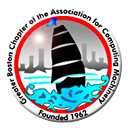Storing Everything Personal
Within five years, our personal computers will be able to store everything we read, write, and hear, and many of the images we see including many of our personal videos. Vannevar Bush outlined such a system in his 1945 Memex article. For the last four years we have worked on MyLifeBits. www.MyLifeBits.com holds personal articles, books, email and written correspondence, photos, video files, web pages visited, and records of telephone calls. The experience and challenges for making such an everyday, useful appliance will be described.
Gordon Bell is currently a senior researcher in Microsoft's Media Presence Research Group - a part of the Bay Area Research Center (BARC). Beginning in 1995 when he joined Microsoft, Gordon had started to focus on the use of computers and the necessity of Telepresence: being there without really being there, then. "There" can be a different place, right now, or a compressed and different time (a presentation or recording of an earlier event). In 1999 this project was extended to include multimedia in the home. He is putting all of his atom- and electron-based bits in his local Cyberspace. It is called MyLifeBits, the successor to the Cyber All project. This includes everything he has accumulated, written, photographed, presented, owns (e.g. CDs), and is acquiring via telephone, meeting capture, etc.. Previously, Gordon Bell spent 23 years (1960-1983) at Digital Equipment Corporation as Vice President of Research and Development, where he was the architect of numerous mini- and time-sharing computers, led the development of the VAX, and pioneered several multiprocessor designs. He has an SB and SM degree from MIT (1956-57) and honorary D. Eng. from WPI (1993). During 1966-72 he was Professor of Computer Science and Electrical Engineering at Carnegie-Mellon University. In 1986-1987 he was the first Assistant Director of the National Science Foundation's Computing Directorate. He led the National Research and Education Network (NREN) panel that became the NII/GII, and was an author of the first High Performance Computer and Communications Initiative. Beginning in 1987 he sponsored "The Gordon Bell Prize" for Parallelism, awarded at the annual ACM/IEEE Conference on Supercomputing. Bell has authored numerous books and papers including "High Tech Ventures: The Guide to Entrepreneurial Success", which describes the Bell-Mason Diagnostic for analyzing new ventures and Computer Structures (with Allen Newell and Dan Siewiorek). He is a founding board member and fellow of The Computer History Museum and is on the advisory boards of Cradle Technology, DiamondCluster Exchange, Dust Inc. and The Vanguard Group. He is also a founder and director of the Bell-Mason Group, supplying expert systems for venture development to startups, investors, governments, and intrapreneurial ventures. Bell is a member of the American Academy of Arts and Sciences (Fellow), American Association for the Advancement of Science (Fellow), ACM (Fellow), IEEE (Fellow and Computer Pioneer), and the National Academy of Engineering. His awards include: the IEEE Von Neumann Medal, the AEA Inventor Award for the greatest economic contribution to the New England region, the IEEE 2001 Vladamir Karapetoff Eminent Member's Award of Eta Kappa Nu, and The 1991 National Medal of Technology.
